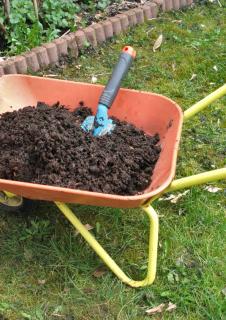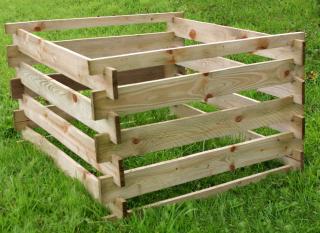

Making your own compost is a practice that helps the environment through recycling waste.
Compost is also an excellent way to create organic matter that is crucial for plant growth.
Thanks to your compost, you’ll feed and fertilize your plant beds without spending a dime… With today’s trend of going local, making your own compost is even more relevant!
Read also:
Compost is an excellent way to recycle plant waste we produce, and use it in the garden as soil conditioner, fertilizer and green manure.
Overall, compost greatly enhances growth of plants, roses, trees and shrubs.
 Compost is best given when plants need it most: their vegetation phase.
Compost is best given when plants need it most: their vegetation phase.
In the vegetable patch, use it to prepare the soil at the end of winter, before the first seeds are sown and plants transferred.
Compost must look uniform and even, have a dark color and a nice, peat-like or earthy smell.
It should break up easily into fine bits.
There are 2 ways of preparing your own compost: in heaps, and in bins.
 Today, a wide range of compost bins are available on the market. Some are built from wood, others plastic. Both are perfectly adapted to transforming plant waste into compost.
Today, a wide range of compost bins are available on the market. Some are built from wood, others plastic. Both are perfectly adapted to transforming plant waste into compost.
Heaps have other advantages: they can extend as needed.
Nonetheless, it is often exposed to rainy weather and birds and other animals that might come forage.
All plant waste from your home and garden can be added to your composter or compost heap.
Recommended organic waste includes:
Some weeds should not be thrown in the compost, especially those that carry seeds, since this would spread them far and wide.
Don’t also add any waste that has been treated chemically with sprays such as weed-killers, pesticides, fungicides and other products that are bad for the environment and for our planet.
There is a very easy and affordable way to make one. This one is for outdoors, but here’s one for apartment composting.
 → Choose a type of wood that is naturally resistant to rot: false-acacia and chestnut wood are excellent.
→ Choose a type of wood that is naturally resistant to rot: false-acacia and chestnut wood are excellent.
Just attach 4 transportation pallets at the corners with wire and place them upright on the ground.
Air circulation is provided for by spaces between boards, and it helps your green matter to break down very well.
It makes sense to set up a hinged opening at the bottom of one pallet, to collect the compost from the pile.
Read also:
Stimulate bacterial activity and that of microscopic life forms in the compost to speed the process up.
Activator agents are 100% organic and can be used in organic agriculture. They enhance waste breakdown.
It guarantees top-quality compost that can be used earlier.